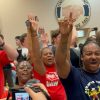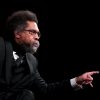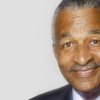We cannot move through or pass the month of July without paying homage to our foremother, Dr. Mary McLeod Bethune, born July 10, 1875, laying down in peace and rising up in radiance May 18, 1955. Let us pour libation for her, then, and raise her righteous name in remembrance and honor for the great work and service she performed in the world and for the legacy she self-consciously left us. For it is written in the sacred Husia “To do that which is of value is forever, a person called forth by her work does not die, for her name is raised and remembered because of it.” So in the tradition of the ancestors, we raise and praise the name and work of this our foremother, Dr. Mary McLeod Bethune, born to Mr. and Mrs. Sam and Patsy McLeod, who taught her to cherish freedom, to love learning, and to always do good in the world
Let us raise up her five royal and righteous names, as done by our ancestors in ancient Egypt, which speak to the great woman she was and will, for us and the world, always be. Master teacher who taught us the good, dignity-affirming, and divine way to walk in the world. Honored mother, great one among the many who nurtured and sustained us in our early history as a new African people, emerging from the Holocaust of enslavement and reconstructing ourselves. Institution-builder who raised above the earth pyramids of possibilities, structures which housed our aspirations and advanced our interests as a people. Freedom fighter who fought to clear away the forests of oppression and injustice and secure and defend the rights, self-determination and dignity of Africans and other peoples of color of the world. Peacemaker, who challenged the peoples of the world to put down their weapons and join minds, hands and hearts to build a fellowship of freedom, mutual respect, equality and peace thru justice everywhere.
Nearing the end of her life, Dr. Bethune, like our ancestors of ancient Africa, set down in writing lessons garnered from a life of learning, service, sacrifice and struggle. She recounts that she asked herself, “If I have any other legacy to leave” in addition to the work, achievement and institutions she bequeathed to us? And she continued, saying “Truly my worldly possessions are few; yet my experiences have been rich. From them I have distilled principles and policies in which I believe firmly for they represent the meaning of my life’s work. So as my life draws to a close, I will pass them on to (Black people) everywhere in hope that an old woman’s philosophy may give them inspiration. Here, then is my legacy.”
She, thus, left us nine legacies or challenges which if embraced, would change our lives and serve us well in meeting the awesome challenge she posed to reconceive and “remake the world.” For she says, “The task is nothing less than that.” First, Dr. Bethune leaves us the legacy and challenge of love. She challenges us to love ourselves, to cultivate brotherhood and sisterhood with each other and other peoples of the world, to be “interracial, interreligious and international.” She rightly wants us to resist that virulent strain of racist and religious hate the oppressor tries to infect us with, making his enemies ours and claiming us as allies in his color-coded rampages against freedom, justice and peace in the world. It is our task, she teaches, to pose a new model of how humans ought to relate and act together in the world in the thoughts we have and share and in the life we live and pursue.
But the stress is always on placing love at the center of our lives in our families and communities and especially, between men and women whose relationships will shape and affect all others. Therefore, in family and community, in every house and down every street, we must suppress the hatred and hostility, end the injuries and violence, and instead practice healing, and peace and the sharing of good, and thus, cultivate the love we all long for and seek in private and public places.
She left us too the challenge of hope, born of the historical record of our people’s rising out of the Holocaust of enslavement, retaining their dignity and humanity in spite of the most dehumanizing of conditions, enduring and prevailing against all odds, and leaving a legacy of “ceaseless striving and struggle” on and upward, and thus, a better world for future generations. Also, she left us the thirst for education. “Knowledge,” she said, “is the prime need of the hour.” But she cautioned it must be a knowledge and education, not for enslavement but for freedom, not for collaboration in our own oppression, but to serve our people. We must, she says, “discover the dawn and then share it with our children and the masses who need it most.”
Her next legacy is the challenge of developing confidence in one another, not only for defense against our oppression, but for the development and flourishing of our lives and the indispensable planning and cooperating for common good. She leaves us too, respect for the use of power, power directed toward freedom, human justice and the serving of our people. And in the pursuit of power she asks us to “select leaders who are wise, courageous and of great moral stature and ability” and “who will work not for themselves but for others.”
Her next legacy is faith, faith in God, in ourselves and especially in our people. She was sure we loved and served the Creator, but she was concerned about our will to love and serve our people in spite of racism and class considerations. Thus, she asks us to challenge ourselves and our leaders to believe in and serve the people. For she says, “The measure of our progress as a race is in precise relation to the depth of faith in our people held by our leaders.”
Bethune leaves us also racial dignity, the challenge for Blacks “to maintain our human dignity at all cost.” She reminds us that “we are custodians and heirs of a great civilization,” and that we must bear the burden and glory of our history with strength, dignity and determination. Furthermore, she leaves us the “desire to live harmoniously with (our) fellow man.” She wants us to recognize that the “problem of color is world-wide,” but she wants our people to “conduct themselves naturally in all relationships,” with dignity, responsibility and respect for our own heritage and to constantly search for and build on common ground with others.
Finally, Dr. Bethune leaves us the legacy and the charge of responsibility to our young people. She urges us to prepare them for the future, to inspire and preserve “their zeal for building a better world,” to insure they “not be discouraged from aspiring toward greatness,” and to not let them forget their obligations to free and serve the masses in our “ceaseless strivings and struggle” as a people, to bring, increase and sustain good in our lives and in the world.
Dr. Maulana Karenga, Professor and Chair of Africana Studies, California State University-Long Beach; Executive Director, African American Cultural Center (Us); Creator of Kwanzaa; and author of Kwanzaa: A Celebration of Family, Community and Culture and Essays on Struggle: Position and Analysis, www.AfricanAmericanCulturalCenter-LA.org; www.OfficialKwanzaaWebsite.org; www.MaulanaKarenga.org.















